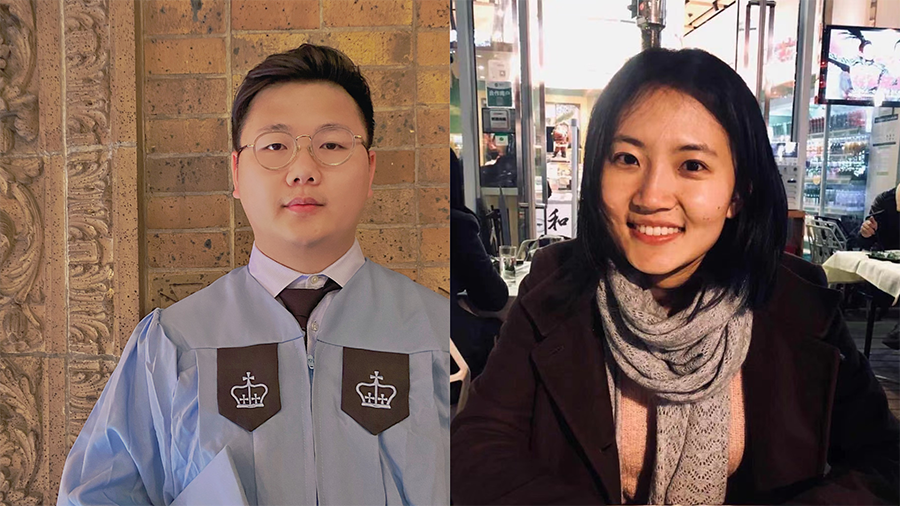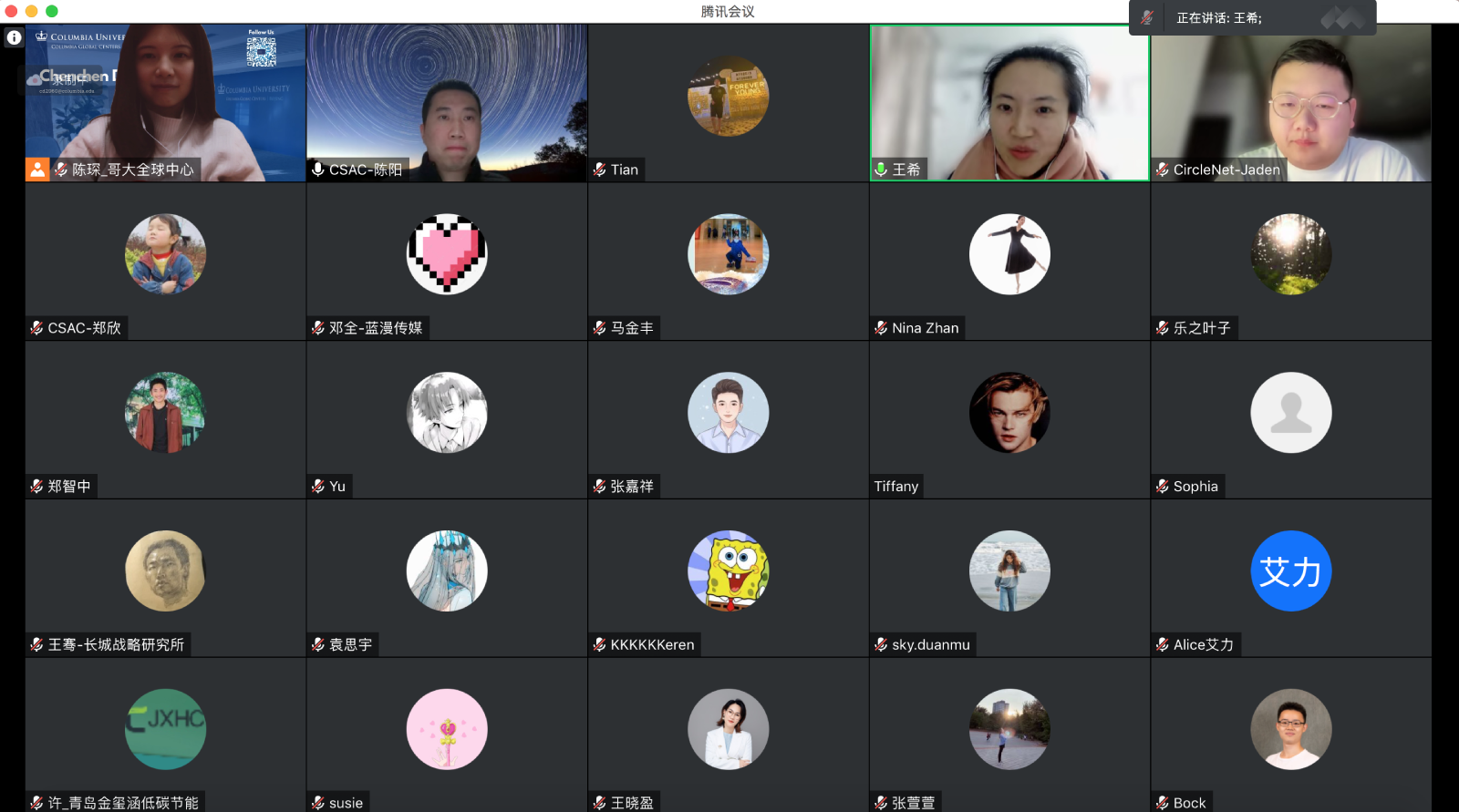Does Entrepreneurship Have a Success Recipe?
CSAC accepted entrepreneurs Zixiang Zhao (SEAS'21'22) and Sissi Wang reflect on lessons learned and gains from the Center's accelerator camp.

If you are returning to China and looking to start and grow your startup in the country, you'll want to know Zixiang and Sissi's stories. Zixiang and Sissi were among the first cohort of the Beijing Center's accelerator camp in 2022, a month-long training program part of the Center's business incubation program called Columbia Startup Accelerator in China (CSAC).
Zixiang graduated from Columbia Engineering with B.S. and M.S. in Neuroengineering. In 2021, he founded CircleNet, a Web3 social media platform that applies blockchain and smart contracts to privatize users' digital assets and facilitate and incubate DAO development models in community operations.
Sissi completed her B.S. at the University of Melbourne and M.S. at the University of Oxford with seven years of experience in IoT product operation and supply chain management. Her startup project Brokrly provides North American real estate agents with one-stop SaaS tools to solve the problem of revenue constraints and improve the efficiency of house sales.
Zixiang and Sissi recently discussed how they survive and thrive as a startup founder during the CSAC Startup Talk & Spring 2023 Accelerator Camp Information Session, where they also talked about their lessons learned and gains from CSAC.
How did the CSAC accelerator camp transform you into the entrepreneur you want to be?
Zixiang: The accelerator camp has expanded my horizon on how different demographics approach entrepreneurship. I have encountered participants of varying age groups, diverse upbringings, and across various academic disciplines. Their different approaches towards entrepreneurship have urged me to think outside the box and carve out a road less traveled by myself.
I want to credit alumni mentors and guest speakers who have informed me about the entrepreneurial mindset in this program. I want to mention an entrepreneur who dabbled in the electronics and e-commerce industry in the 1990s when mobile phones weren't widely popularized. He terminated this startup after estimating its low potential to succeed in the foreseeable future. Nevertheless, in hindsight, we all know e-commerce has evolved into one of the most lucrative businesses in the 21st century. This anecdote has prompted me to contemplate my decision-making strategy.
HEAR MORE ABOUT ZIXIANG'S STORY
CSAC has also offered me valuable resources and connections. I received an interview from MiraclePlus during my attendance at CSAC, a precious opportunity that can catapult my business into the next stratosphere.
How has entrepreneurship motivated your personal growth?
Sissi: I learned that strategic transformation is a necessary component of entrepreneurship. My business model underwent two pivotal reformations after I made new discoveries. Before Brokrly, I tested the water in the gaming industry with my previous project Clutchy—a metaverse community for people to discover, share, and celebrate the highlight of their digital experiences—which got me accepted to CSAC's first accelerator camp. I quit gaming after realizing it was not my passion. This decision eventually landed me in interior design — a field I'm enthusiastic about. I concluded that familiarity with interior design reduced my learning costs and reinforced my perseverance.
My second reinvention was made with the epiphany that the demand for interior design is very time-sensitive. Such epiphany led to my partnership with real estate agents who will direct tenants to my business after home rental or purchase. Familiarity in this field makes me more observant and business-savvy in the process.
In addition, the transition from a team member and collaborator to a leader and a decision-maker have urged me to step out of my comfort zone and practice self-determination. Entrepreneurship experience has also taught me the importance of open-mindedness and resilience.

What are some of the frustration you encountered along the way?
Zixiang: I consider the high opportunity cost one of the biggest challenges during entrepreneurship. During my partnership with other team members, scheduling conflicts and overwhelming workloads from regular jobs have led to coordination problems and low task completion rates. The time commitment to an entrepreneurship project entails a lot of dedication.
Sissi: I would identify the most significant roadblock as my introverted personality. I'm paranoid that my disposition will affect networking and team-building efficiency. I must conquer my self-doubt to proactively approach investors and persuade them to root for my project.
What suggestions would you offer to solve each other's problem?
Zixiang: In response to Sissi's concern, I would say to begin with what your project can bring to the investors during your initial interaction. It's pivotal to highlight your project's competitive advantage and potential value. Once a mutual benefit is agreed upon, communication will naturally flow.
Sissi: My suggestion would be to prioritize attracting investments, thus finding a sustainable way to finance your project. The first agenda, therefore, should be determining the prerequisite to convincing investors.
LEARN ABOUT THE BEIJING CENTER'S ACCELERATOR CAMP
What advice would you give to the prospective entrepreneurs in our audience?
Zixiang: I highly encourage the audience to enter a field they are familiar with and specify the problem they're trying to solve. I want to emphasize the necessity to research previous projects, as oftentimes, the ideas we regard as innovative have already been taken. Comprehensive research on competitors and existing products before launching a business is crucial for cost minimization and time maximization. The key to success is to think creatively and come up with an idea too unique to be replaceable.
Sissi: Pursuing a path filled with uncertainties requires unconventional thinking to conquer a human's intuitive risk aversion mentality. Occasionally, giving up an ongoing project to begin again can be extremely exhausting and challenging. However, it's the most efficient option when you realize the current plan wouldn't work.
My epiphany as an entrepreneur is that you will never feel fully prepared at the current moment, but it shouldn't be the reason to prevent you from taking the first step. Launching a project is scary, but it shouldn't lead to procrastination. You should proceed with a bold hypothesis and cautious experimentations. If you're determined to keep improving in the long run, this won't be your most sophisticated moment from hindsight, but it's an excellent place to start. Last but not least, don't forget to follow your heart in the journey.